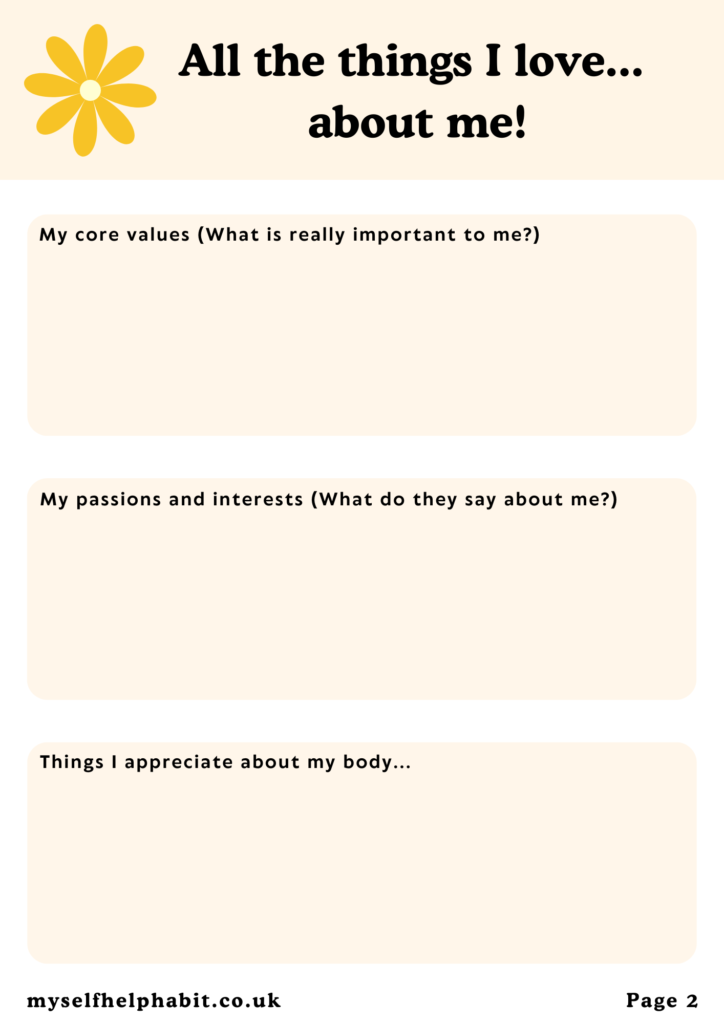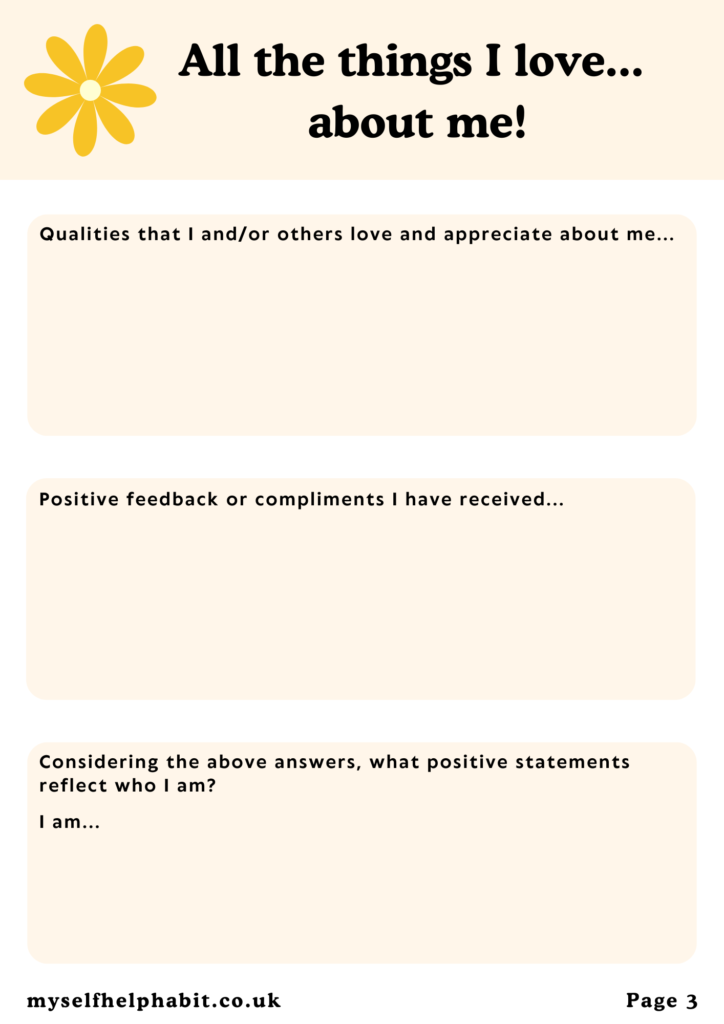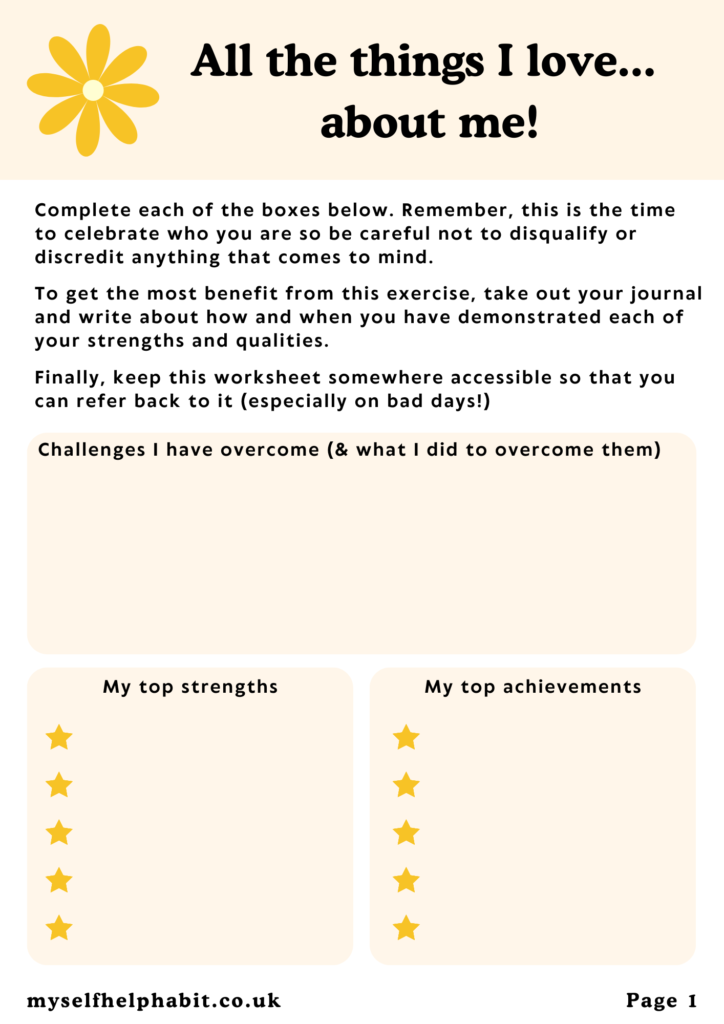
The route to self-acceptance
What did you learn about loving and accepting yourself as you were growing up?
What is your relationship with yourself like now?
When I was growing up, to ‘love yourself’ was actually considered an insult! Unlike today, where we see messages plastered all over social media telling us to go forth and love ourselves, the phrase often implied that you were vain, self-centred and overly confident and, in an attempt to take you down a peg or two, it was hurled at you if you dared to walk around with your head held high. Believe me, you did not want to be seen to be loving yourself!
Looking back, I can recall many instances where I received the message that it was not ‘OK’ to love and be who I was. I was surrounded by magazines aimed at teenage girls that gave the outward message that how I looked was somehow ‘wrong’ and needed to change, especially if I wanted to obtain that ultimate goal which, according to these magazines, all teenage girls should aspire to…a boyfriend!
Then, like many others, as I roamed the corridors of high school hell, I was teased about my body shape and size and pretty much any quality that made me unique. Even in the classroom, my teachers made it clear that my quiet and introverted nature was unacceptable which, rather than enticing me out of my ‘shell’, only made me feel a deep sense of shame.
So, what did I take from all these messages? That it wasn’t actually safe to love myself. To stay small and not draw too much attention to myself. To feel bad if I looked in the mirror and saw something I liked. To hide away my body and feel ashamed of the way it looked. To seek out approval from others and to do anything necessary to get their acceptance.
Did it get easier as I grew older? Did I care any less about what others thought of me? The short answer is no! The insecurities I had acquired followed me around as I went through all the usual life stages and I found myself constantly looking for external validation to ‘prove’ I was acceptable in some way or other.
All those memories and messages take time to unpack, and the scars that they leave behind are not so quick to heal. However, as I am gradually coming to a place of self-acceptance, I thought I would share what has helped me along the way.
Don’t worry, I’m not going to throw a load of self-love affirmations at you and tell you to go and love everything about yourself. I know it is not that easy! This post explores the concepts of self-love and self-acceptance and why we can find it so difficult to apply these concepts to ourselves. It includes lots of coaching questions and exercises to help you to acknowledge the thoughts and feelings you have about yourself, identify triggering situations, challenge the way you perceive yourself, and embrace all the things that make you who you are!
*Disclosure: If you buy books linked to my site, I may earn a commission from Bookshop.org, whose fees support independent bookshops.
Why is it important to love and accept yourself?
Self-love encompasses all the warm and tender feelings that you have towards yourself. If you love and value yourself then you will treat yourself accordingly. This may mean speaking to yourself with compassion, engaging in self-care activities, and allowing yourself to have positive, enjoyable and rejuvenating experiences.
Despite the messages you may have received when you were growing up, loving yourself does not mean that you are ignorant of your flaws, that you never put anyone else first, that you lack compassion for others, or think you are more important than everyone else. However, if declaring your love for yourself seems like a step too far right now then try starting with self-acceptance.
Accepting yourself means that you are able to approve of yourself regardless of the fact that there are qualities or physical features that you would rather not have. When we accept ourselves it means that we understand that we have both negative and positive aspects to ourselves and that is OK. We do not need to beat ourselves up about the parts we dislike or think that we are any less worthy because of them. We do not need to write ourselves off, attach demeaning labels to ourselves, or allow others to mistreat us. It is about changing our relationship with those parts of us rather than denying them, over-compensating, or trying to cover them up. We just accept that, right now, they are a part of us.
Self-acceptance is not the same as ‘apathy’ or thinking that you are incapable of change. There might be quite a few things you want to work on and change for the better! However, instead of criticising ourselves all the time, we can go forward with more compassion for who we are. If we accept ourselves, we no longer need to rely on others to make us feel worthy or fulfilled and can make the changes that we actually want to make rather than being influenced by what others want us to do.
Cut yourself some slack!
When it comes to figuring out why we find it so hard to accept ourselves we firstly need to show ourselves some compassion! Everyday we are bombarded with messages about how we ‘should’ look, what is acceptable and unacceptable behaviour, what are desirable and undesirable personal qualities, who we should love, what success looks like, and how we should live our lives. These standards can be impossible (and even undesirable) to live up to, especially all of the time.
And it starts right from infancy. As we grow up we acquire conditions of worth which basically tell us what we need to do in order to receive love and acceptance from our parents or caregivers. For example, you may have come to believe that you are particularly of value if you, ‘do your very best at all times’, ‘try to please everyone’, ‘obey the rules’, ‘achieve high grades’, ‘get a professional job’, ‘look attractive’, ‘be strong’, etc. As we are too young to question such messages, we take them on as our own values and beliefs. The problem is that we start to believe that we are only acceptable if we meet these standards. If we do not live up to such expectations then we blame ourselves and may feel like we are not ‘enough’ in some way.
On top of that, we may have gone through adverse childhood experiences and been on the receiving end of hurtful comments and actions from other family members, authority figures, teachers and peers. All of these experiences can influence how we perceive ourselves and how we relate to others.
Celebrating yourself and highlighting your good points may also not have been encouraged in your culture. For example, in British culture we can be very self-depreciating and modest. It is no wonder we can have a hard time getting our heads around the idea of self-acceptance, let alone self-love!
We need to become aware of our conditions of worth and any other negative messages we have received around loving and being ourselves. We can then learn to challenge them and get back in touch with our own values and beliefs.
As a way of identifying your conditions of worth, you may want to reflect on the things that you find hard to accept about yourself and look at where these difficulties have come from*.
- What was valued and highly prized in your family?
- What did you need to do in order to feel loved and accepted?
- What were you praised for?
- What was not tolerated or frowned upon?
Of course, we can’t go back and change the past (or others for that matter!) but we can work on our own responses in the here and now and acknowledge that some of these values, beliefs, expectations and standards are not ours to hold anymore. We can determine what is no longer serving us and how we want to move forward with our lives.
*As with all activities that involve revisiting past events, do this exercise with compassion for yourself and others. Stop if the activity becomes too distressing and find somebody supportive who will listen to you as you discuss any thoughts or feelings that have come up. This could be a trusted friend/family member, a coach, a counsellor/therapist or get in contact with the Samaritans.
Sometimes it just isn’t about you!
But how about when you are trying to love and accept yourself and there are people around you who are are being disrespectful and mean?
As well as setting firmer boundaries, and looking at how I respond to conflict, another useful tool I have learned is to ‘bat back’ what is not mine (I thank my counselling tutor for this helpful analogy!) You simply imagine having a tennis racket and then batting the comments back over to the other person. When you ‘bat’ a comment or action back to someone, it is almost like saying, ‘that hang-up actually belongs to you, here have it back’.
Of course, I’m not made of stone, these comments still sting when they come at me, but it is helpful to remind myself that when a nasty or spiteful comment comes my way it is often a reflection of the other person’s insecurities and the messages from their childhood that they are carrying around and projecting onto others. This also makes me feel more compassion, I can hand the comments back to them and recognise that they may be navigating some difficult stuff too. Sure, I can take whatever I need from their comments, sometimes there may be a valid point or grain of truth hidden in them, but ultimately that is for me to decide!
How do you evaluate yourself and your actions?
How often do you trust the judgements you make?
How much do you value your own opinion?
How much weight do you put on other people’s judgements and opinions?
Our locus of evaluation is where we derive our assessments of ourselves, other people and our environment. An internal locus of evaluation is where we form decisions, judgements and opinions from within, using our personal values and instincts. An external locus of evaluation comes from outside of ourselves. It is where we allow the influences of others (such as their values and beliefs) to inform our views and actions. Sometimes this may mean that we look to others for approval and to judge whether something is acceptable or not.
While we don’t need to completely disregard the opinions of others, we need to strike a balance between our internal and external locus of evaluation (with slightly more emphasis on our internal locus of evaluation).
You can start by exploring where your views, judgements, opinions and decisions are really coming from (especially in relation to yourself). For example, you could ask yourself:
- Is this something that I have previously been taught that I ‘should’ value, believe and want? If so, what do I think now?
- What does my own instinct or experience tell me?
- What are my personal values in relation to this situation or issue?
When do you feel uncomfortable?
I absolutely love going abroad with my family and getting some sun, good food and R&R. But, as I get myself perched on the sunbed, ready to catch a few rays, I become painfully aware of other holidaymakers and how amazing they look. I immediately feel self-conscious and want to cover up (only the 38 degree heat stops me from reaching for my sarong!) I have come to realise that anywhere I am required to wear a swimsuit my insecurities about my body are sure to be triggered!
It’s not about avoidance, I really don’t want to limit where I can go and what I can do because of my insecurities, or other people’s opinions on how I ‘should’ look. I know where the discomfort stems from and that I need to be able to face these situations and realise that I am OK, regardless of how I feel at the time.
However, I do find it helpful to acknowledge when something is going to be difficult for me and, as much as possible, to prepare myself for these situations. I’ve decided that this year I am going to put my focus on all the things that I love to do. This means savouring quality time with my family, swimming in the pool, taking a page turner of a book with me, and enjoying the warm weather!
Notice the situations in which you are unkind to yourself or that seem to leave you feeling bad about yourself in some way.
- What situations make you feel less accepting of yourself? Why do you think that is?
- How could you be kinder to yourself in these situations?
Set your boundaries with others
A boundary is basically a personal limit that you set, usually in relation to how you allow others to treat you. You can establish boundaries in many different ways, such as when deciding who and what you spend your time on, what kind of behaviours you will and wont accept, and when sharing your personal space and belongings with others.
Think about the relationships you have with others and where your boundaries might need strengthening (especially if someone’s behaviour is impacting on your confidence and self-esteem). You may need to think about reducing time with such people or developing some coping strategies while you are around them.
To identify your personal boundaries think about:
- What lines are being crossed when you get annoyed with someone or feel resentful?
- Consider the relationships in your life. Where are your needs not being communicated or met?
- What will you and won’t you accept from others? This could be in terms of topics that are off limits, what you are willing to do for others, behaviours you are no longer willing to tolerate, and comments you do not want or appreciate.
You can then decide where the lines need to be drawn. Once you know your boundaries, you can start communicating them. You may have to keep reminding others of your boundaries because it may not go down well at first (especially if they have benefited in some way from you not having boundaries!) You may also feel uncomfortable doing this if past conditioning has taught you not to confront people and to put the needs of others before your own.
However, there are steps you can take to start asserting your boundaries. Firstly, you need to practice stating clearly what you would like to have happen in particular situations (for example, ‘I want you to…’) and instead of immediately agreeing to things, give yourself time to consider a request and say ‘no’. You could also begin by simply stating your needs and preferences in situations where you would usually just go with whatever someone else decides.
Develop a balanced view of yourself
Let’s think about the people we love. As well as knowing that they have plenty of things that we absolutely adore about them, they also have habits and qualities that drive us up the wall! Do we love them any less? Not really. We love them regardless! That’s what we need to do for ourselves! We need to acknowledge that while there are things that we find hard to accept about ourselves, we also have lots of good qualities too!
We can be really hard on ourselves, and slip into using extremes or absolutes to describe our failings and all the things that we don’t like about ourselves (for example, ‘I always…’, ‘I never…’, ‘I’m such a…’) When you really start to notice the statements that you make about yourself you can question their accuracy and put things into perspective by closely examining the facts (see the Observe your self-talk section below).
Your negativity bias may also be in operation. This is where you tend to ignore, or quickly discount, the positive events, information or comments that come your way in favour of noticing and dwelling on the bad things that have happened. For instance, it may be that you received one piece of negative feedback in your appraisal at work and you ruminate on that all evening instead of acknowledging all the positive comments that you have had about your work. You then start to doubt yourself instead of recognising that it is just one comment or opinion and there are many others that you could choose to focus on.
Show yourself some love!
I have found that as I have made more of an effort to take better care of myself it has helped to open up a space for self-love. It is almost like I am giving myself a signal that I matter and that I am worthy of care.
So, think about how you can meet your needs and help yourself to recharge. Make a list of all the activities that enable you to stay healthy, that make you take a pause in your day and relax, that fascinate you and pique your interest, and that bring a little bit of fun and joy into your life. Consider how you can start scheduling these activities into your day, week or month. Even if it is just small pockets of time, the consistency of your actions will make all the difference!
If you are stuck for ideas, start by noting any (healthy) activities that you do in your day which improve your mood and leave you feeling energised or calm. You could also look out for activities that you see others doing that seem appealing to you.
Check out my bumper self-care post which has a list of self-care ideas plus a free journal and wheel of self-care exercise to help you to reflect on how you can get more of the self-care that you really need.
Look out for anything that prevents you from carrying out self-care and then challenge yourself to think of ways to overcome such obstacles. This may include noting when your inner critic pops up and starts guilt tripping you into doing anything other than self-care! If this happens then challenge such thoughts using the guidance in the Observe your self-talk section.
Embrace the things that you do like about yourself
There will be parts of yourself that you can love or, at the very least, like! These may include certain aspects of your personality, your passions and interests, your skills and abilities, your values, your achievements, and, yes, even parts of your body!
In the book Overcoming Low Self Esteem*, the author, Melanie Fennell, recommends committing to recording the qualities, skills and strengths you show as you go about your day (noting down your actions and the type of qualities demonstrated). Fennell advises that if positive qualities do not easily come to mind then you could think of negative qualities that do not apply to you and therefore state that you are the opposite of those. For instance, if you are not a ‘selfish’ person then this implies that you may be someone who is considerate of others.
Another useful technique, suggested by Fennell, is to think of any qualities you have that you may be dismissing as ‘nothing’ but would really appreciate if someone else demonstrated them. For example, if you always remember people’s birthdays and make sure you do special things for them then this suggests you are thoughtful, loving and generous. While you may think, ‘Well that’s just what people do, isn’t it?’ Think again! Not everyone does this and, if someone did the same for you, would you dismiss it so easily as ‘nothing’?
If you are still struggling to pinpoint anything then have a word with a supportive friend or loved one and ask them what they love and appreciate about you.
Be aware of any self-critical thoughts that show up when you are doing this activity and try to sabotage your efforts. For example, your inner critic may say things like, ‘Yeah, but…’, ‘You are not always…’, and ‘So and so is better at…’ If these thoughts occur, note them down and challenge them using the questions and techniques under the Observe your self-talk section.
No matter how insignificant you may think any of your qualities are, they deserve to be acknowledged. So, when you are ready, download and complete the Things I love about me worksheet.


Once you have filled out the worksheet, put it somewhere accessible and look at it whenever you need to, especially on those really unkind days!
To strengthen your memory, and ability to recognise, your best and most valued attributes, Fennell suggests that you do some journaling around when you have demonstrated them (either recently or in the past) and go into as much detail as possible.
- What did you do?
- Where were you?
- Who else was there?
- What could you see, hear, taste, touch and smell?
- What was the outcome?
Observe your self-talk
To be more loving and compassionate towards yourself, you need to learn to challenge that inner critical voice that pipes up with all sorts of judgy and self-depreciating comments as you go about your day.
This starts with awareness of what your inner critic says to you and when it tends to appear. Over the next couple of weeks, consider the following questions and make a note of your observations.
- How do I talk to myself?
- When am I most self-critical? Why is that?
- How does my self-talk impact on my ability to love and accept myself?
- Does the way I talk to myself mostly help or hinder me?
If your self-talk is particularly unkind then try out some of the strategies below.
Re-frame self-critical thoughts
Keep a notebook to hand and start capturing any self-critical thoughts that pop into your mind throughout the day. Once you have a thought written down, you can assess and challenge it using the questions below:
- What facts appear to support this self-critical thought? Are they really ‘hard’ facts or are they just an opinion or interpretation?
- What is the evidence against this critical thought? When has it proven not to be true? Is it always completely true, 100% of the time?
- What else could be true?
- Is this self-critical thought helpful to me? What purpose might it be serving?
- What is the cost of thinking in this way? How do I feel and behave as a result?
- Does this thought signify any unhelpful thinking habits?
- Considering everything, what would be a more helpful, compassionate and accurate thought to hold? Make sure that this thought is still believable to you and is one that you could take forward in future situations!
Speak to yourself as you would to a dear friend
Usually, we are much kinder and more understanding towards others than we are to ourselves. When your inner critic appears and starts saying mean and unhelpful things to you, practice tuning into a more compassionate voice by imagining what you would say to a friend, loved one or your child if they were having the same thoughts or were going through the same issues as you.
- How would you see things then?
- What would you want to say to your friend, loved one or child?
- How would you speak to them? What tone would you use?
Now, say all those loving, kind and compassionate things to yourself!
Forgive yourself and focus on what you have learned
When you have made a mistake or experienced some kind of rejection or failure, has admonishing yourself relentlessly ever really made you feel any better? Probably not! It is perfectly human to have our failings. We do not need to keep beating ourselves up for the rest of our days because of these experiences. We can instead turn them into opportunities for growth.
If you are finding it difficult to move on from a mistake or a perceived failure then consider these questions:
- What have I learned from this experience?
- How can I grow from this experience?
- What are the positives that can be derived from this experience?
- What other possibilities are opening up for me now?
Practice mindfulness
Mindfulness can help you to become an observer of your thoughts rather than allowing yourself to be taken in by them. Thought defusion, which involves learning to separate and distance yourself from distressing thoughts, can be effective in reducing the impact that self-critical thinking has on you. Therapist Aid has created a resource that contains lots of simple techniques that you can put into practice to help you to defuse your thoughts.
You may also want to try noticing when your mind is wandering into unhelpful territory. You can bring yourself back into the present moment by engaging with your senses. Turn your attention to what you can see, hear, taste, touch and smell. If it helps to focus your mind, you could write down and describe what you notice around you. You could also try listening to a guided meditation. Mindful Magazine have several freely available on their website for people who are keen to learn how to meditate.
All of these practices can help you to feel more compassionate towards yourself. If you would like to dig into this topic in more detail then take a look at Dr Kristin Neff’s work on self-compassion at self-compassion.org and check out the free meditations and exercises provided.
How do you want to live your life?
There may have been times when you have allowed others to influence your decisions and have gone ahead with all kinds of things just to gain their approval. You might have even found yourself trying to change who you are in order to please people or meet society’s expectations and ideals.
If this is the case, start getting back in touch with what you want out of life and create goals that are in alignment with who you are. Take a step back and answer the following questions in your journal:
- What do you really care about?
- What are your core values? How can you live more in alignment with these values?
- How you want to ‘be’ in this world (what are your principles, standards and core beliefs)?
- What does success mean to you personally?
- What really interests and excites you?
- What are the things that you would like to experience?
- What would you like to accomplish in your lifetime?
Now consider how you can live in accordance with the answers you have given rather than focusing on what others may think and how they are living their lives.
Start a gratitude practice
If you are feeling low, or are stuck in comparison mode, it can prevent you from seeing and appreciating all the good things in your life. While your situation may not be ideal, think about what you can be grateful for right now.
You may even want to incorporate a gratitude practice into your daily routine. You could keep a gratitude journal each evening or get into the habit of jotting down things that have gone well in the day. This will help to improve your mindset and give your mood a good boost.
My journey to self-acceptance has been a difficult one, but the concepts and activities described above have made the path a little smoother, enabling me to identify qualities that I like about myself, to engage in self-care, and feel compassion for the parts of me that I find hard to accept. From there, self-love has started to grow. I have learned some useful tools to challenge those unkind voices from the past (and even the ones in the present) and realised that no matter what I do, not everyone is going to like or approve of me (and that’s OK). I no longer have to hold myself to any conditions before I can love and accept myself. I can choose to let go of the old and outdated messages from the past and be happy as I am right now!





